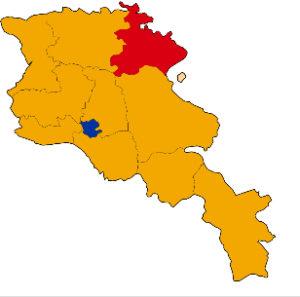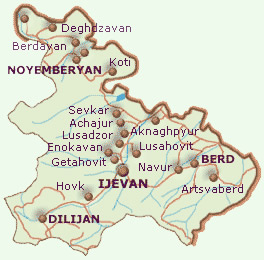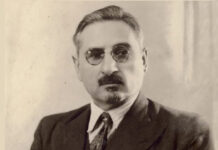WikiLeaks – Armenia, No 25
UNCLAS SECTION 01 OF 03 YEREVAN 002485
SUBJECT: (IMI) ARMENIA: REPORT ON TAVUSH PROVINCE
——-
SUMMARY
——-
¶1. In October 2004, Embassy’s BISNIS representative visited the Tavush province of Armenia to explore investment and trade opportunities for U.S. companies and to expand U.S. – Armenian commercial ties. He met with the province’s business leaders and government officials. This is another in a series of regional trips that reach out to local companies throughout the country to promote the BISNIS “Search for Partners” and “Trades and Tenders” programs and collect information on investment and commercial opportunities for U.S. companies. Best prospects are listed in paragraphs 14-16 below. End Summary.
————————–
TAVUSH: GENERAL BACKGROUND
————————–
¶2. Tavush province is located in the North-Eastern part of Armenia. The total area of the province is 969 miles. According to the Tavush Governor’s Office, the province’s population is 134,000, including 49,000 urban residents and 85,000 rural residents. The province shares a border with Azerbaijan to the East and Georgia to the North.
¶3. The climate in Tavush is mild continental, with average maximum temperatures of 90 degrees Fahrenheit in summer and 50 degrees in winter, and minimum temperatures of 68 degrees Fahrenheit in summer and 23 degrees in winter. The region’s altitude ranges from 980 feet to 9,200 feet.
¶4. Tavush’s mineral resources include a wide range of building materials including basalt, granite, quartzite, and marble, as well as bentonite, mineral paints, semiprecious stones, coal, dolomite and gyps.
¶5. Tavush’s industrial potential is concentrated in the four largest cities, the capital Ijevan, Dilijan, Berd and Noyemberyan. The province’s large and medium-sized enterprises are involved mainly in building materials, woodworking, rug manufacturing and food processing industries. All of the former Soviet factories in this region have been privatized. The province’s industrial production in 2003 totaled approximately USD 7 million, while agricultural production grossed USD 47 million.
¶6. Food processing is one of the fastest growing sectors of the province’s economy. Tavush has a long history of wine making. The region’s vineyards are located at an altitude of 2,300-3,900 feet. The Ijevan Wine Factory was established in 1951 as a small processing enterprise and was converted into an open joint stock company in 1995. The factory is equipped with modern grape processing and wine bottling lines imported from Germany. The winery’s products include several types of wines, including red dessert wine, semi-sweet wine, white table wine, red table wine, and rose table wine. The company exports its products to the United States, Russia, and Japan. The company received both financial and technical assistance from the U.S. Department of Agriculture’s Marketing Assistance Project Office in Yerevan.
¶7. The Bentonite Joint Stock Company was established in 1973 and privatized in 1996. It specializes in the production of bentonite powder used for oil-well drilling, molding and rubber manufacturing. Bentonite deposits are located very close to the plant. Bentonite JSC exports its products mainly to CIS countries. Companies from Poland and Switzerland have expressed interest in purchasing Bentonite’s products. Bentonite’s new owner (the Moscow-based company Okro Okroyan) and management have ambitious plans to increase the company’s exports as well as upgrade existing production and processing lines.
¶8. The province’s leading industrial enterprise is the Ijevan Rug Factory, which was established in 1964 and privatized in 1995. The factory produces a wide range of wool rugs. During Soviet times it was one of the largest rug producers and exporters. Since 1981 the factory has been the only exporter of wool rugs from the former Soviet Union to Arabic countries, China and Eastern Europe. The factory is equipped with German made machines and is able to manufacture approximately 13 million sq. feet of rugs annually. Currently the factory does not utilize its full capacity. Production and sales have been growing, however, since the local bank recently acquired a stake in the company.
¶9. Dilijan-MIGE JSC operates a mineral water bottling plant in the resort town of Dilijan. The company is owned by Mikhail Bagdasarov, an Armenian-Russian businessman. Most of the company’s production is exported to CIS countries, the Middle East, and the U.S. Currently, the company is upgrading the existing equipment to increase the plant’s capacities.
¶10. Dilijan’s Impulse plant was founded in 1967 specializing in the production of communication equipment ordered by the Soviet Defense Ministry. In 1995 the plant was turned into a state-owned joint- stock company. In 2002 it was privatized by Yerevan- based Radiotechnika LLC, the owner of several production plants as well as large trade centers throughout Armenia. After a significant renovation of the plant’s facilities it plans to establish a production of truck semi-trailers as well as an assembly line for consumer electronics.
¶11. Tourism is an attractive sector for investments in Tavush province. The resort town of Dilijan is located in the mountainous part of the province near several old monasteries. During Soviet times it was one of the most famous tourism centers in Armenia. The city has numerous spas and health centers. Recently Armenian-American businessman James Tufenkian initiated the Dilijan city center development program with an investment of more than USD 500,000. The development program includes the construction of a 24-room hotel, restaurants, stores, and small studios and showrooms where Armenian art and crafts will be exhibited.
¶12. Tavush province is a transit point for road and rail traffic to and from Georgia. The largest Armenian customs post is located at the village of Bagratashen on the Georgian border. Near the village there is a popular wholesale open-air market for consumer goods and food products. A large number of Armenian and Georgian small- and medium-sized vendors trade at this market where they can take advantage of a customs exemptions for the goods they personally carry across the border.
¶13. Most enterprises operating in Tavush have potential and need to establish long-term cooperation or a partnership with foreign investors. The Embassy encourages interested U.S. firms to contact the Political-Economic Section of the Embassy or the BISNIS Trade Specialist for Armenia Ellen House by phone at: (202) 482-2284 or e-mail at Ellen_House@ita.doc.gov.
——————-
TRADE OPPORTUNITIES
——————-
RUG MANUFACTURING
¶14. (1) COMPANY: IJEVAN RUG FACTORY (IRF) IRF was established in 1964 as a state-owned enterprise. It was fully privatized and converted into a joint stock company in 1997. The company produces various sizes of wool rugs. IRF imports raw materials mainly from Turkey and Russia. The company seeks an established U.S. supplier of raw materials, including wool yarn, polyamide yarn, linen, and cotton yarn. The projected annual demand for these products is 3,000 tons.
————————
INVESTMENT OPPORTUNITIES
————————
AUTOMOTIVE
¶15. (2) COMPANY: IMPULSE
Dilijan’s Impulse plans to produce truck semi-trailers. Impulse seeks a U.S. partner that would provide financing and new technologies. Impulse will contribute its production space, inexpensive labor force as well as partial financial investment. The total project cost is estimated at USD 500,000.
¶16. (3) COMPANY: IJEVAN MECHANICAL PLANT
Ijevan Mechanical Plant (IMP) was established in 1976. In 1995 in was privatized and turned into an open joint- stock company. The plant specializes in the production of small-sized farming equipment, including cultivators, mowing-machines, and plows. The company would like to become a distributor of a U.S. manufacturer of small- and medium-sized farming equipment. IMP also seeks to establish a joint venture with an American company to begin production of equipment for farmers, including cultivators and mowers.
EVANS















